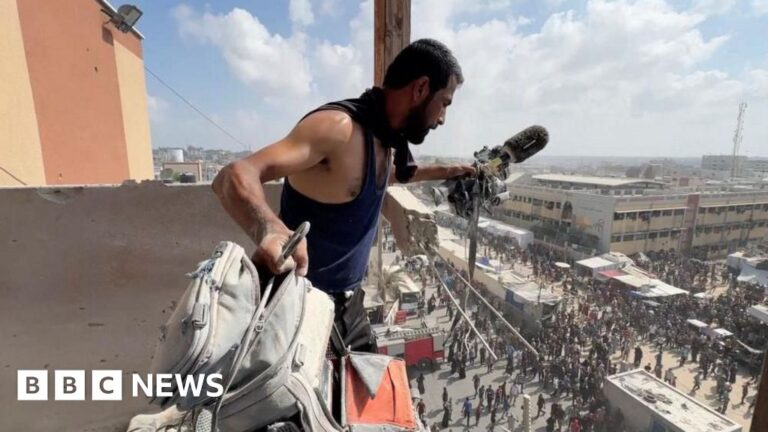BBC News, London and Jerusalem
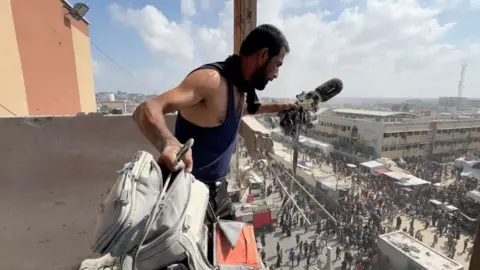 Reuters
ReutersA double Israeli strike on a hospital in Gaza killed 20 people including journalists and health workers, according to the outlets they worked for, the World Health Organization and the Hamas-run health ministry.
At least one person was killed in an initial strike, and others in a second attack minutes later as rescuers and journalists attended the scene at Nasser hospital in Khan Younis.
The five journalists worked for international media outlets, including the Associated Press, Reuters, Al Jazeera and Middle East Eye.
Later on Monday, Israeli Prime Minister Benjamin Netanyahu called the incident a “tragic mishap” which Israel “deeply regrets” and said military authorities were “conducting a thorough investigation”.
How the attack unfolded
The first strike hit at around 10:00 local time, medical staff at Nasser said.
There was “mass panic… chaos”, said a British medical professional working at the hospital, who was treating patients in the intensive care unit at the time.
Approximately 10 minutes later there was another blast in the same spot, the medical professional said, adding that medical staff had been planning their escape from the building when the second strike hit.
The hospital’s emergency department, inpatient ward, and surgical unit was hit, according to the World Health Organization. Its head Dr Tedros Adhanom Ghebreyesus said the emergency staircase was also damaged.
BBC Verify has seen footage to confirm these timings.
A livestream by Al Ghad TV shows several emergency workers responding to the first strike near the top floor of Nasser Hospital, as a number of journalists in the background film what’s happening.
A staircase, where journalists often gather to broadcast from, is visible in the video. A strike then directly hits the emergency workers and reporters, sending smoke and rubble in the air. At least one body is visible in the aftermath.
A separate video, filmed from the same staircase, shows the aftermath of the strike. Bodies can be seen on the staircase, as medics respond to the attack.
Another clip, filmed in front of the main entrance of Nasser hospital, shows a medical worker holding up bloodied clothes to the camera, before an explosion sends people running for cover.
The British medical professional described seeing “trails of blood all over the floor” and “absolute scenes of chaos, disbelief, and fear”.
Who were the victims?
The identities of the slain journalists have been confirmed but we know little about the other fatalities. The Hamas-run health ministry said rescuers and patients were killed.
Husam al-Masri worked as a cameraman for Reuters. The news agency reported he was killed in a first strike on the hospital while operating a live TV feed for Reuters. News organisations around the world including the BBC have used footage he has taken.
Mariam Dagga, 33, was a freelance journalist working with the Associated Press (AP) who said she regularly reported from the hospital. One of AP’s regional editors, Abby Sewell, said Dagga leaves behind a son who was evacuated from Gaza earlier in the war.
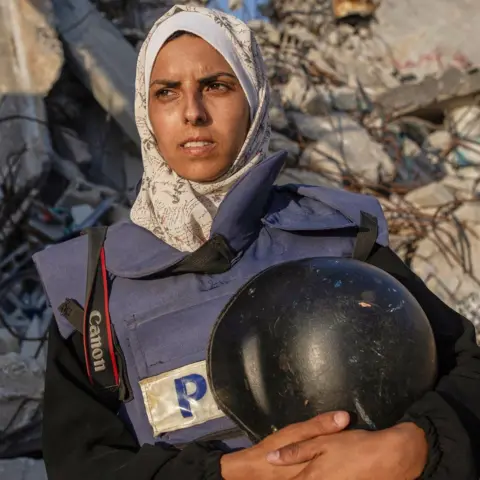 AP
AP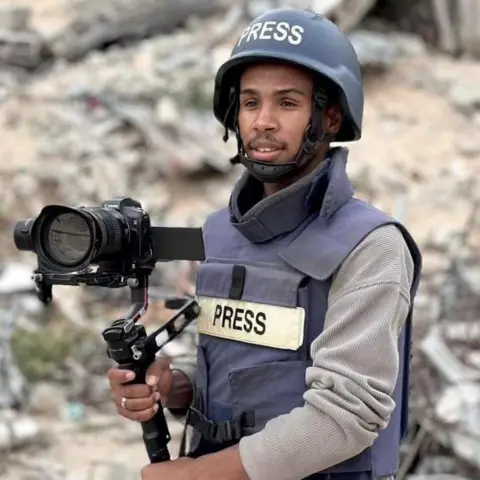 Reuters
ReutersMohammad Salama worked for Al Jazeera and Middle East Eye. Salama was planning his wedding to another journalist, Hala Asfour, with the pair hoping to wed after a ceasefire, according to Al Jazeera.
Ahmed Abu Aziz worked for Middle East Eye, according to its own reporting. The outlet says he worked on a freelance basis and was based in Khan Younis.
Moaz Abu Taha worked with various outlets, including the Israeli newspaper Haaretz just a fortnight ago filming a video call with journalists that showed children suffering from malnutrition at Nasser. Reuters said they occasionally published work by him.
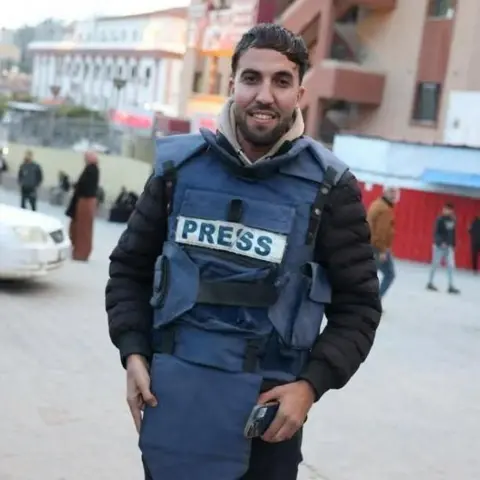 Reuters
Reuters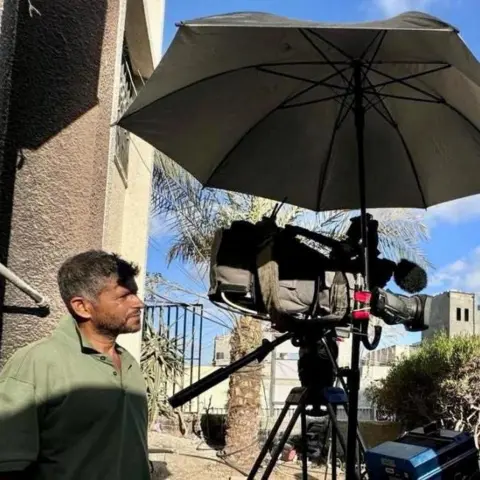 Reuters
ReutersIsrael does not allow international news organisations, including the BBC, into Gaza to report freely. Local reporters are relied upon to provide information to the world’s media agencies.
The Committee to Protect Journalists (CPJ) says more than 190 journalists have been killed in 22 months of war, the vast majority Palestinians killed in Israeli attacks.
Two weeks ago, Israel killed six journalists in a targeted attack on one of them near Shifa Hospital in Gaza City, drawing outrage.
What does Israel say?
The Israel Defense Forces (IDF) initially confirmed it carried out a strike in the area of Nasser Hospital in southern Gaza.
Throughout the day, Israeli officials issued multiple statements with little information in them, indicating a lack of clarity within the military about the attack but designed to address widespread outrage.
On Monday evening, Prime Minister Benjamin Netanyahu’s office said Israel “deeply regrets the tragic mishap that occurred today at the Nasser Hospital in Gaza”, adding that Israel “values the work of journalists, medical staff, and all civilians” and saying the military was conducting a “thorough investigation”.
However, the statement does little to address the apparent “double-tap” nature of the attack. The fact that most of those who were killed were struck by the second attack at precisely the same location around 10 minutes later appears clearly intentional.
“Double taps” are a controversial military tactic that are designed to maximise casualties by firing on those who respond to the scene of a first attack.
Statements from media organisations, including the Foreign Press Association in Israel and the Occupied Palestinian Territories, accused the Israeli military of a pattern of intentionally targeting journalists throughout the war.
It is unclear if and when Israel will publish results of the internal inquiry it says it has begun.
Wider reaction to the killings
UN Secretary General António Guterres strongly condemned the “horrific killings” at Nasser hospital, which he said “highlight the extreme risks that medical personnel and journalists face as they carry out their vital work amid this brutal conflict”, and called for a “prompt, and impartial investigation”.
UK Foreign Secretary David Lammy said he was “horrified” and called for an immediate ceasefire.
French President Emmanuel Macron called the strikes “intolerable” and said civilians and journalists must be protected. He renewed the call for humanitarian aid to be allowed inside Gaza and for Israel “to respect international law”.
Germany’s foreign office said it was “shocked”.
Meanwhile, US President Donald Trump said he was unaware of the strikes, but when asked for his reaction he said he was “not happy about it”.
Media freedom groups also issued condemnation.
“When and where is it going to end? There is international law,” said the head of Reporters without Borders Thibaut Bruttin.
“There are guarantees that should be granted to journalists covering conflicts, and none of that seems to be applying.”
The Committee to Protect Journalists said: “Israel’s broadcasted killing of journalists in Gaza continues while the world watches and fails to act firmly”.
The Foreign Press Association said the latest killings must serve as a “watershed moment” and urged international leaders to act. It called on Israel to “halt its abhorrent practice of targeting journalists”, adding that “too many journalists have been killed by Israel without justification”.

